HVAC Companies Markfield
Find top HVAC Services in Markfield
Receive up to 3 HVAC Companies quotes for your project today! Compare profiles, reviews, accreditations, portfolio, etc... and choose the best offer.
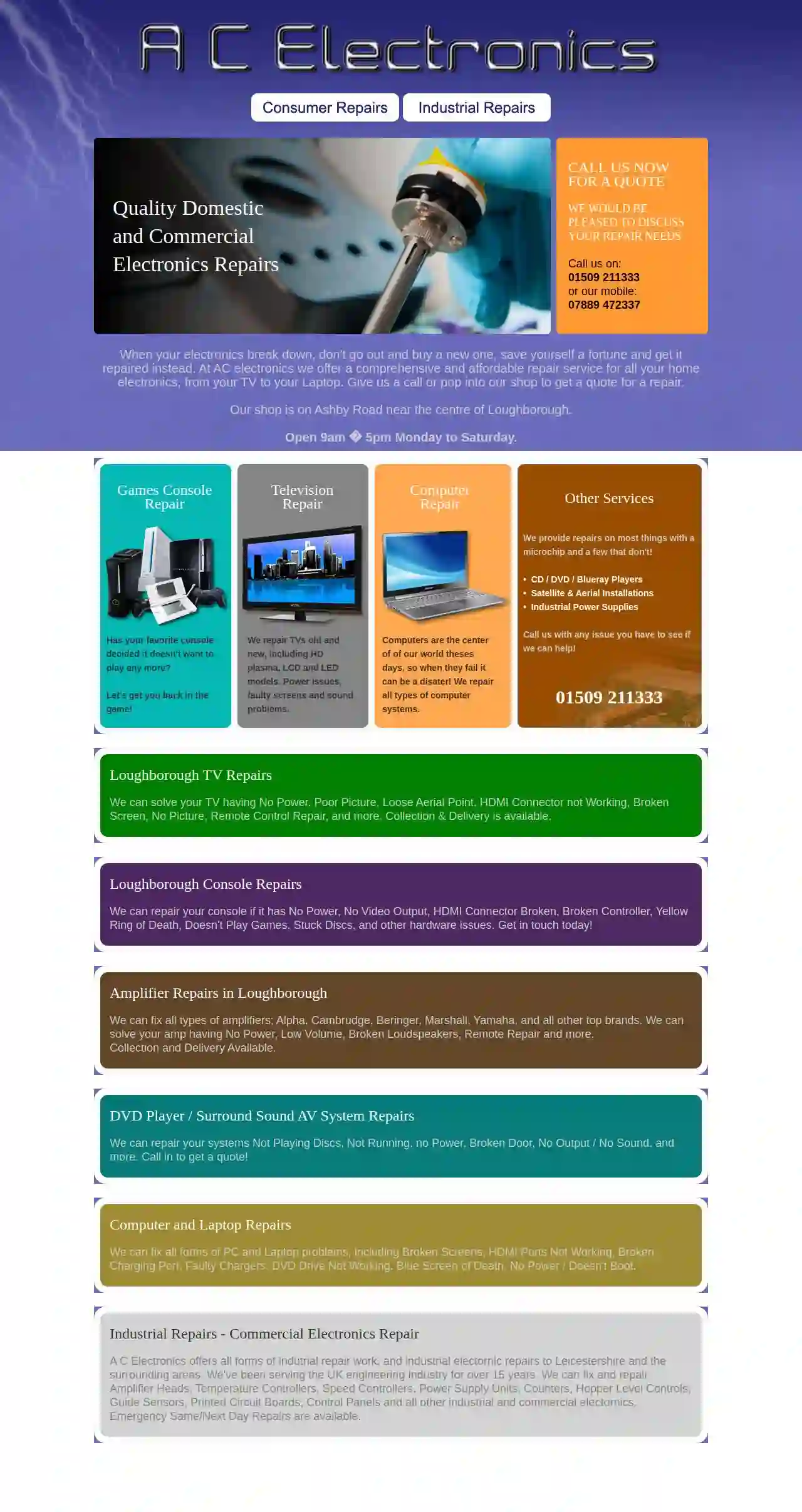
ac electronics
4.7160 reviewsAshby Road, Loughborough, GBAt AC Electronics, we offer a comprehensive and affordable repair service for all your home electronics, from your TV to your Laptop. We've been serving the UK engineering industry for over 15 years. We can fix and repair Amplifier Heads, Temperature Controllers, Speed Controllers, Power Supply Units, Counters, Hopper Level Controls, Guide Sensors, Printed Circuit Boards, Control Panels and all other industrial and commercial electronics. Our shop is located on Ashby Road near the centre of Loughborough and we are open 9am - 5pm Monday to Saturday.
- Services
- Why Us?
- Gallery
Get Quote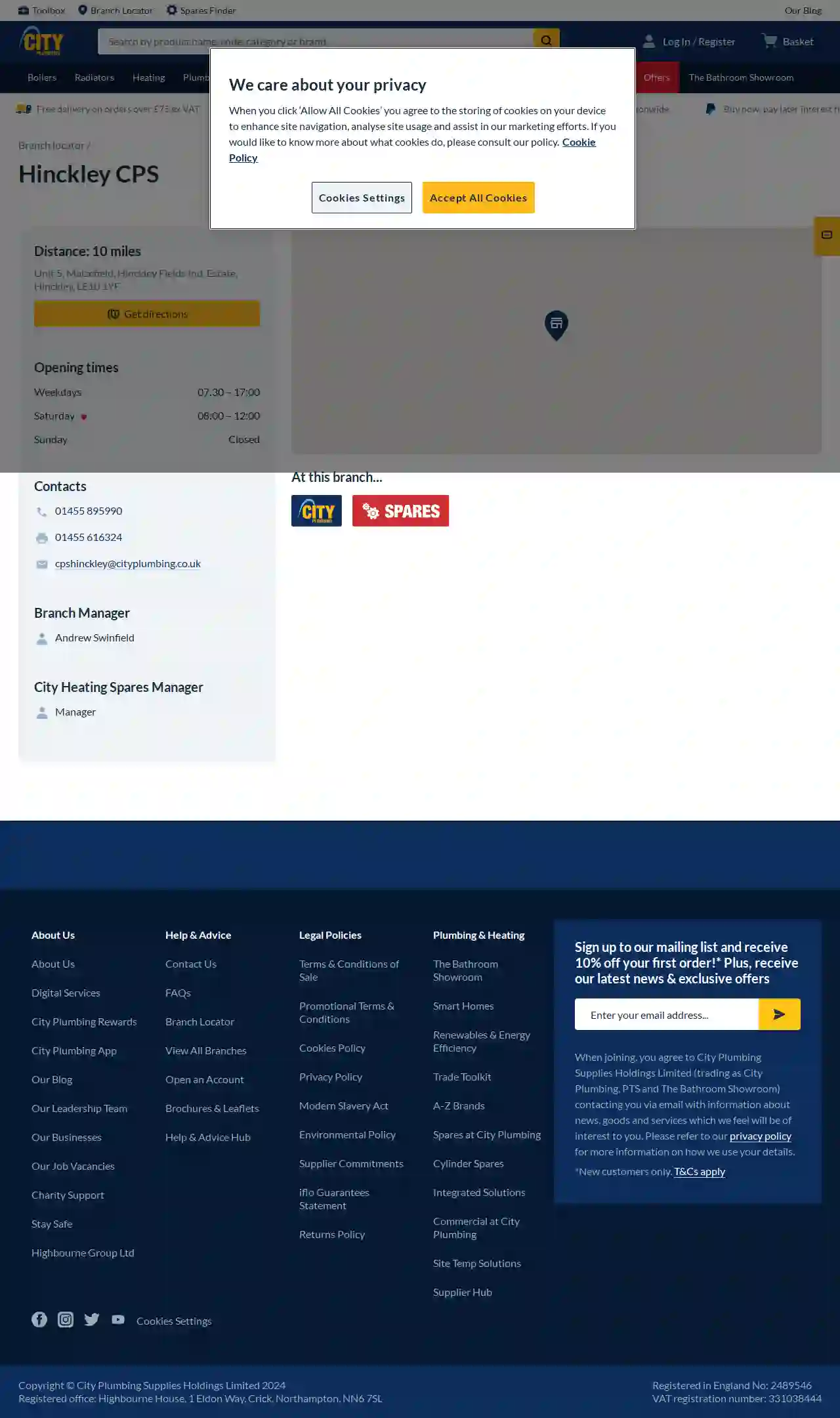
City Plumbing
32 reviewsunit 5, maizefield, hinckley fields ind. estate, hinckley, Hinckley, LE10 1YF, GBCity Plumbing are your trusted plumbing and heating suppliers for the trade. Whether you’re fitting a new boiler, radiator or full bathroom suite, we’ve got all the tools you need to get the job done. From electricals to plumbers’ supplies and much, much more – we stock all the top brands at affordable trade prices. When you’re on a job, time is money. That’s why we stock a wide range of essential products. From copper tubing to towel rails, we’ll make sure you get the plumbing supplies you need within a day or so. As award-winning plumbers’ merchants and specialist distributors, we’ve got over 350 branches across the UK and have been serving our loyal customers for over 40 years. As such, we offer next-day delivery and click & collect options to suit you – because nobody likes to be kept waiting. For the best quality plumbing supplies from reputable manufacturers, find your local branch or get in touch with our team. If you’d like a little more inspiration, come on down to our bathroom showrooms. Our specialist team is always on hand to offer professional advice to assist you with your next project.
- Services
- Why Us?
- Accreditations
- Gallery
Get Quote
Mark Denny
Sheffield, S44, GBMark Denny is a heating engineer based in Sheffield, serving Nottingham, Leicestershire, Sheffield, East Midlands, and South Yorkshire. With 20 years of experience, he is trained by leading brands like Biasi, Glow-worm, Vaillant, Baxi, Potterton, and Main. He is also British Gas trained and offers economical pricing. Mark prides himself on providing prompt, tidy, reliable, professional, and expert service.
- Services
- Why Us?
- Accreditations
- Our Team
- Testimonials
- Gallery
Get Quote
Transcool Ltd
32 reviews166 Battram Road, Coalville, LE67 1GB, GBTranscool is a refrigeration company based in the East Midlands, specialising in refrigeration applications. Our competent trained Refrigeration Engineers carry out efficient economic refrigeration repairs and service. We understand a small food takeaway has different requirements to corporate manufacturers, so we tailor our service to meet your needs. We are always keen to save our customers money in all aspects, be it energy saving or economical solutions. We are dedicated to meeting your temperature control and refrigeration needs whilst delivering exceptional service and customer care.
- Services
- Why Us?
- Testimonials
- Gallery
Get Quote
Workplace Safety Management Ltd
Unit 1 Garden Court, Gee Road, Coalville, LE67 4NB, GBWorkplace Safety Management are a well established provider of dust & fume, heating & cooling and general ventilation systems for multi application requirements. We design systems to suit your requirements and future objectives. Our design engineers have all attained the industry standard BOHS P602 design of LEV systems module. Workplace Safety Management can help you in all areas of air quality: Bespoke Dust and Fume Extraction applications, Galvanised Ductwork installations, PVC-U Plastic Ductwork Installations, Polyporpylene Ductwork Installations, Industrial Roof Fans, Factory Cooling, Industrial ventilation systems, Spraybooths, Vehicle Exhaust Systems. Coshh/LEV P601 accredited testing & Air Monitoring. Applications we cover: Welding Fumes, Grinding Dust, Soldering Fumes, Oil Mist Solvent Fumes, Wood Dust, Solvent and Chemical Fumes, Vehicle Exhaust Gases, Paint Fumes, Food Processing Applications, General Ventilation. Our installed systems provide a comprehensive solution to many airborne pollutants. Our dedicated engineers provide nationwide support and installation service, including maintenance contracts and breakdown cover, lev, coshh, and air quality testing with P601 accreditation for the commissioning of LEV systems. Authorised PLYMOVENT Midlands Distributor. Extraction, Ventilation, Heating & Cooling for many applications.
- Services
- Why Us?
- Accreditations
- Our Team
- Gallery
Get Quote
E & L Heating & Air Conditioning, Inc.
519 reviews2575 Center Road, Hinckley, 44233, GBFamily owned and operated since 1981, E & L has an outstanding customer service team who will send a professionally trained technician that has met our extremely high personal and professional standard. We are located in beautiful Hinckley, Ohio and are proud to be one of Northeast Ohio's most trusted HVAC companies. We strive to be in constant communication with our customers until your job is complete or all questions have been answered. We are grateful when you allow us into your home to perform a job and are mindful that our time there is brief...but it's where you live every day.
- Services
- Why Us?
- Testimonials
- Gallery
Get Quote
GalxC Cooling Midlands
Coalville, GB- Services
- Why Us?
- Gallery
Get Quote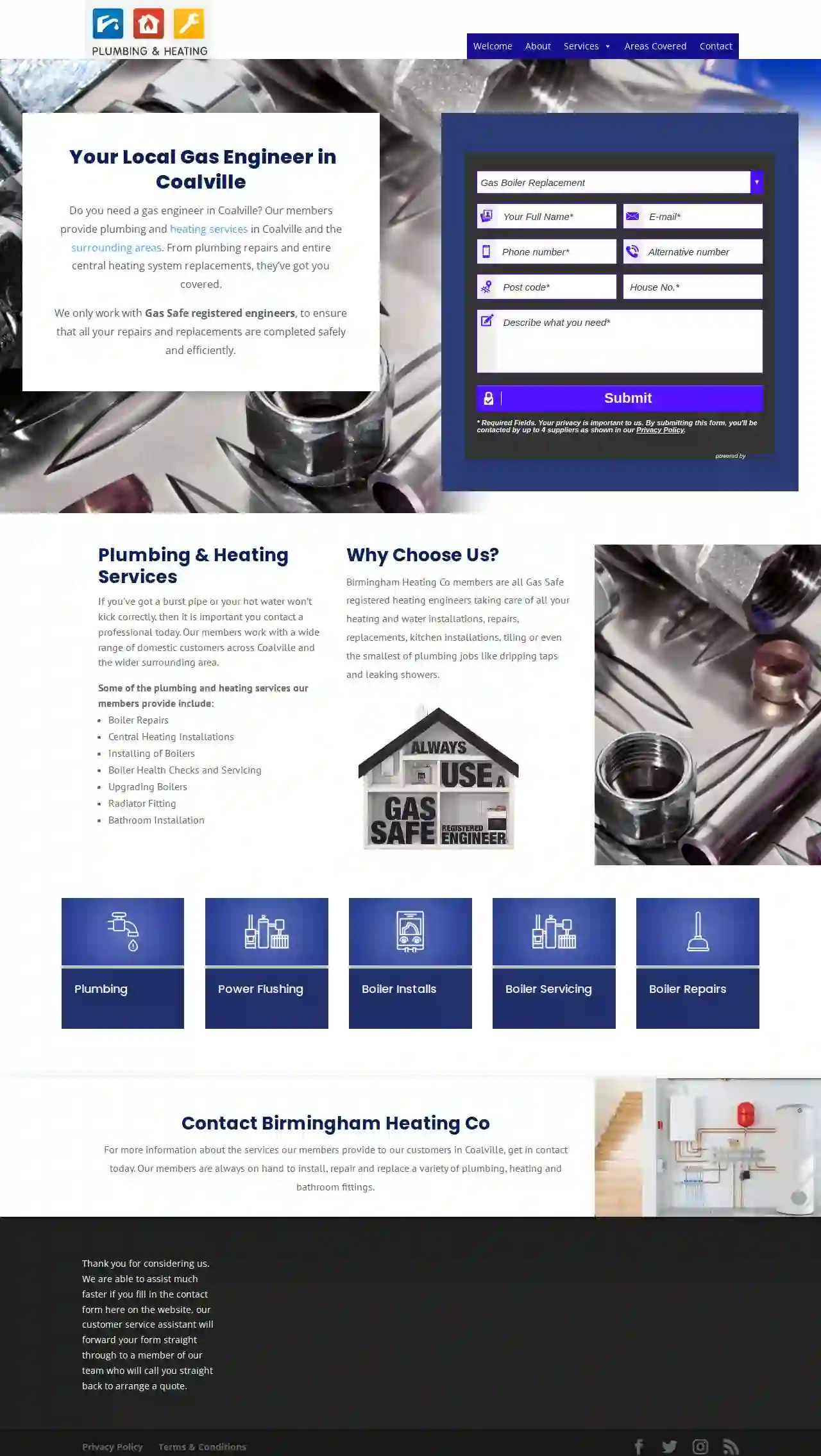
G mcCarthy & son
32 reviewsBirmingham, 123 Main St, B1 1AA, GBBirmingham Heating Co provides plumbing and heating services in Birmingham and the surrounding areas. Our members are Gas Safe registered engineers, ensuring all repairs and replacements are completed safely and efficiently. We offer a range of services, including boiler repairs, central heating installations, boiler health checks and servicing, upgrading boilers, radiator fitting, and bathroom installation. Our team is dedicated to providing excellent customer service and ensuring that all our customers receive the highest level of workmanship and professionalism.
- Services
- Why Us?
- Gallery
Get Quote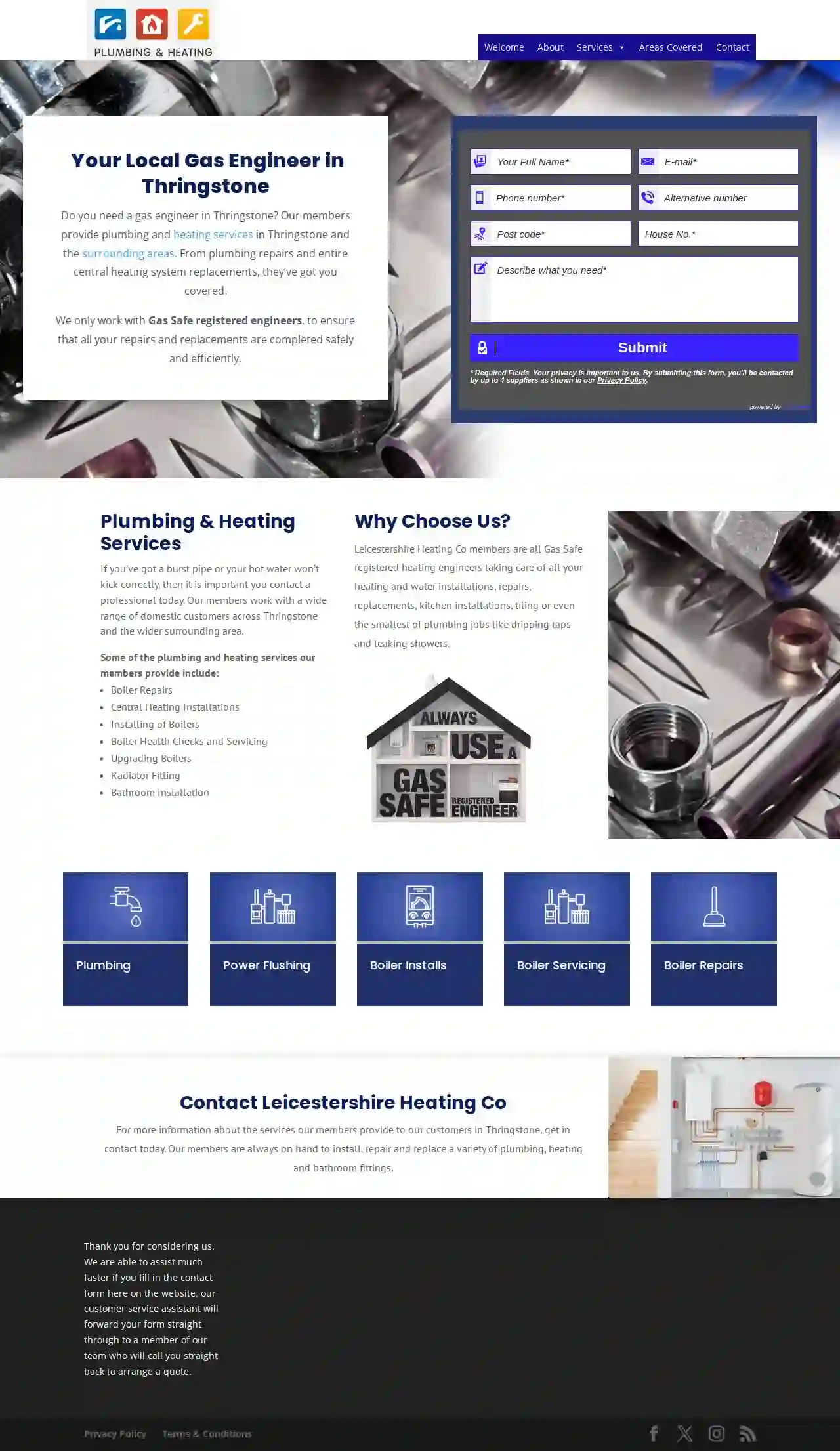
Anderson Gas Heating Services
Coalville, GBLeicestershire Heating Co provides plumbing and heating services in Leicestershire and the surrounding areas. Our members are Gas Safe registered engineers, ensuring all repairs and replacements are completed safely and efficiently. We offer a range of services, including boiler repairs, central heating installations, boiler health checks and servicing, upgrading boilers, radiator fitting, and bathroom installation. Our team is dedicated to providing excellent customer service and ensuring that all our customers receive the highest level of workmanship and professionalism.
- Services
- Why Us?
- Gallery
Get Quote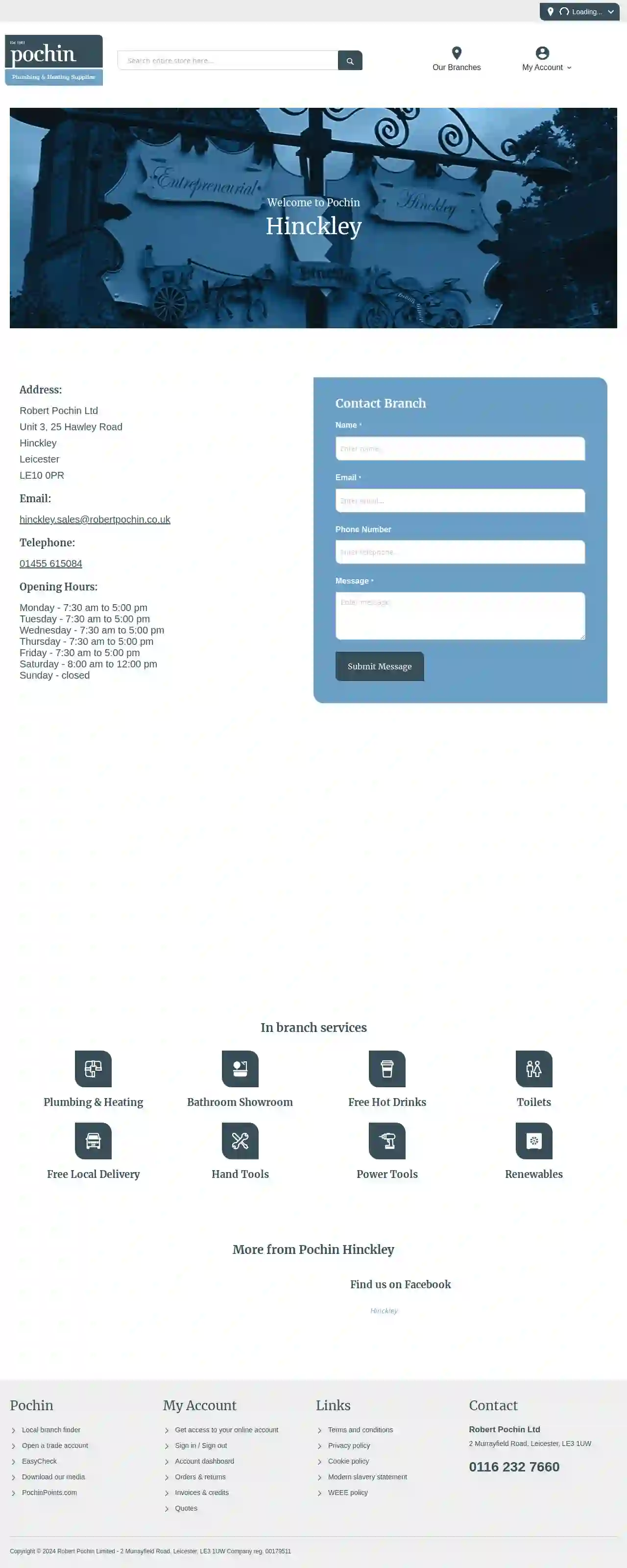
Pochin
53 reviewsUnit 3, 25 Hawley Road, Hinckley, LE10 0PR, GBRobert Pochin Ltd is a leading supplier of plumbing and heating products, serving the trade and public for over 100 years. With a wide range of products from top brands, we offer everything you need for your next project, from basic tools to complete bathroom suites. Our knowledgeable and friendly team is always on hand to offer expert advice and support. We are committed to providing our customers with the best possible service and value, and we are proud to be a trusted name in the industry.
- Services
- Why Us?
- Gallery
Get Quote
Over 12,692+ HVAC Companies registered
Our HVAC experts operate in Markfield and surroundings!
HVACCompaniesHub has curated and vetted Top HVAC Companies near Markfield. Find a top & reliable pro today.
Frequently Asked Questions About HVAC Companies
- Climate: Heat pumps are generally more efficient in moderate climates, while furnaces are better for colder regions.
- Budget: The upfront cost of different systems can vary significantly.
- Energy Efficiency Goals: Higher-efficiency systems are usually more expensive upfront but result in lower energy bills over time.
- Home Size and Layout: The square footage and layout of your home affect the system's capacity and ductwork requirements.
- Existing Ductwork: If you have existing ductwork, you'll need a system compatible with it.
- Reduced Airflow: Noticeably weaker airflow from your vents.
- Dusty Vents: Dust accumulation around your vents.
- Increased Dust: More dust than usual in your home.
- Allergies or Respiratory Issues: Worsening allergy symptoms or respiratory problems.
- Higher Energy Bills: Your furnace becomes less efficient.
- Overheating: The system overheats due to restricted airflow.
What type of HVAC system is best for my home?
What is a ductless mini-split system?
How can I tell if my furnace filter needs changing?
What is the difference between an AC unit and a heat pump?
What type of HVAC system is best for my home?
- Climate: Heat pumps are generally more efficient in moderate climates, while furnaces are better for colder regions.
- Budget: The upfront cost of different systems can vary significantly.
- Energy Efficiency Goals: Higher-efficiency systems are usually more expensive upfront but result in lower energy bills over time.
- Home Size and Layout: The square footage and layout of your home affect the system's capacity and ductwork requirements.
- Existing Ductwork: If you have existing ductwork, you'll need a system compatible with it.
What is a ductless mini-split system?
How can I tell if my furnace filter needs changing?
- Reduced Airflow: Noticeably weaker airflow from your vents.
- Dusty Vents: Dust accumulation around your vents.
- Increased Dust: More dust than usual in your home.
- Allergies or Respiratory Issues: Worsening allergy symptoms or respiratory problems.
- Higher Energy Bills: Your furnace becomes less efficient.
- Overheating: The system overheats due to restricted airflow.